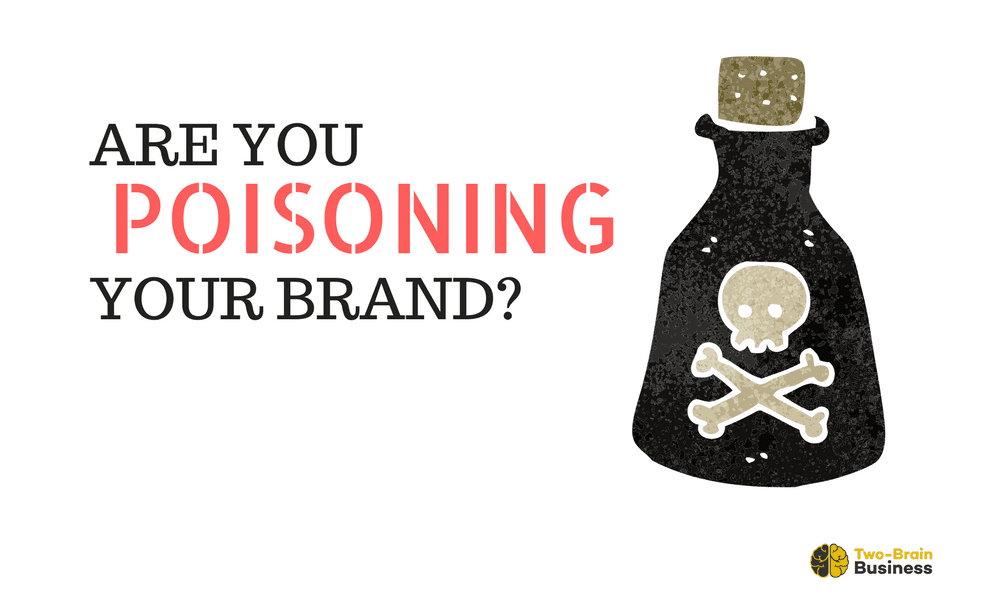When you open a business, you step onstage.
Everything you say is spoken into a microphone.
Everything you write is printed on a billboard.
Everything you do is reported in the tabloids.
It’s never been easier to build an audience. But when they’re all in their seats, what message will you tell them?
That message is your brand.
In this series, I’m going to tell you how to build your brand.
First, I’m going to tell you how to stop poisoning your brand—even if you’re a positive person, you need to read this).
In Part 2, I’m going to tell you why clarity is more important than art.
In Part 3, I’m going to tell you how to determine whether your brand is effective or not (and then how to fix it).
On Two-Brain Radio, Certified Two-Brain Mentor Jay Williams will tell you what he learned at the StoryBrand seminar.
And in the final installment, we’ll recap the top takeaways so you know exactly what to do next.
How to Stop Poisoning Your Brand
“It is better to remain silent at the risk of being thought a fool than to talk and remove all doubt of it.” —Maurice Switzer
A current maxim in business strategy demands that we “be authentic.”
Great advice—unless you’re a jerk. Or if you’re thinking about sharing a strong political opinion with your clients. Or you can’t spell very well.
Your clients are paying for a professional service. Your online persona has to reinforce your professional value.
A few weeks ago, a gym owner asked if her husband’s social media posts were hurting their business. This was a first for me, but obviously she was worried enough to ask. And for good reason: His personal Instagram feed was full of “kick ’em all out!” and “build the wall higher!” memes. There was some pretty outrageous stuff in there. His political affiliation wasn’t just polarized: It was extreme. Even a conservative would feel uncomfortable reading some of this stuff.
How would a client feel? How would he or she associate those beliefs with the business?
Like it or not, every entrepreneur is a public figure. The easiest way to get “likes” on Facebook is to be likable.
I’m not recommending that you fake anything. I’m suggesting you consider your audience before you post.
Gary Vee and the F-Bombs
Gary Vaynerchuk is one of many “authenticity” advocates. Watch any of his videos from the last five years and you’ll him use the F-word like a comma. His audience is entrepreneurs now.
But his audience used to be neighborhood people who wanted to buy wine from his dad’s shop. Watch Wine TV’s first few years’ worth of episodes. Is there a single swear word?
Go ahead and check. Here’s the first episode to get you started.
Before the “Gary Vee” hype, Vaynerchuk was selling wine to a local audience of higher-income clients. He was mostly an owner-operator trying to turn a low-wage job into a profitable business. He did. But he’s not the same person selling the same product now.
Even his 1002nd episode, shot in 2016, he uses the language of his wine audience—not the language he was using on stage for entrepreneurs at the same time. His language, clothing and manner aren’t evolving; they shift depending on who’s in front of him. At 21:56 in the above video, he says “I day-trade attention.” And the right attention matters.
The same language, posture and attitude that attract audiences to his keynote speeches would turn off most of his wine-drinking audience. So he puts on a collared shirt to do Wine Library TV, calms down by 10 notches and uses different words. One viewer’s wine is another’s poison.
Many entrepreneurs want to believe that the “hustle” excludes them from social best practices. They huddle with other founders because they believe that no one else understands them. They cultivate an “outsider” image. And in making themselves distinct from those they would serve, they’re saying, “You’re not like me.”
Take it from a guy who’s made the mistake: Don’t try to be cooler than your audience. Create the platform on which they can be the cool kids—not you. Think friends, not followers. Use the language, dress and habits of those you want to attract.
By all means be authentic. Show people who you really are. And constantly strive to improve that person.
Other Media in This Series
Branding 101: Clarity Is Greater Than Art
Branding 101: What Are They Hiring You to Do?
StoryBrand: Can It Help You Acquire More Clients?
Branding for Farmers, Founders, Tinkers and Thiefs

